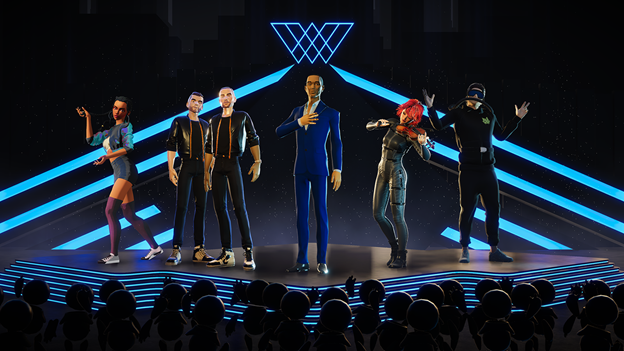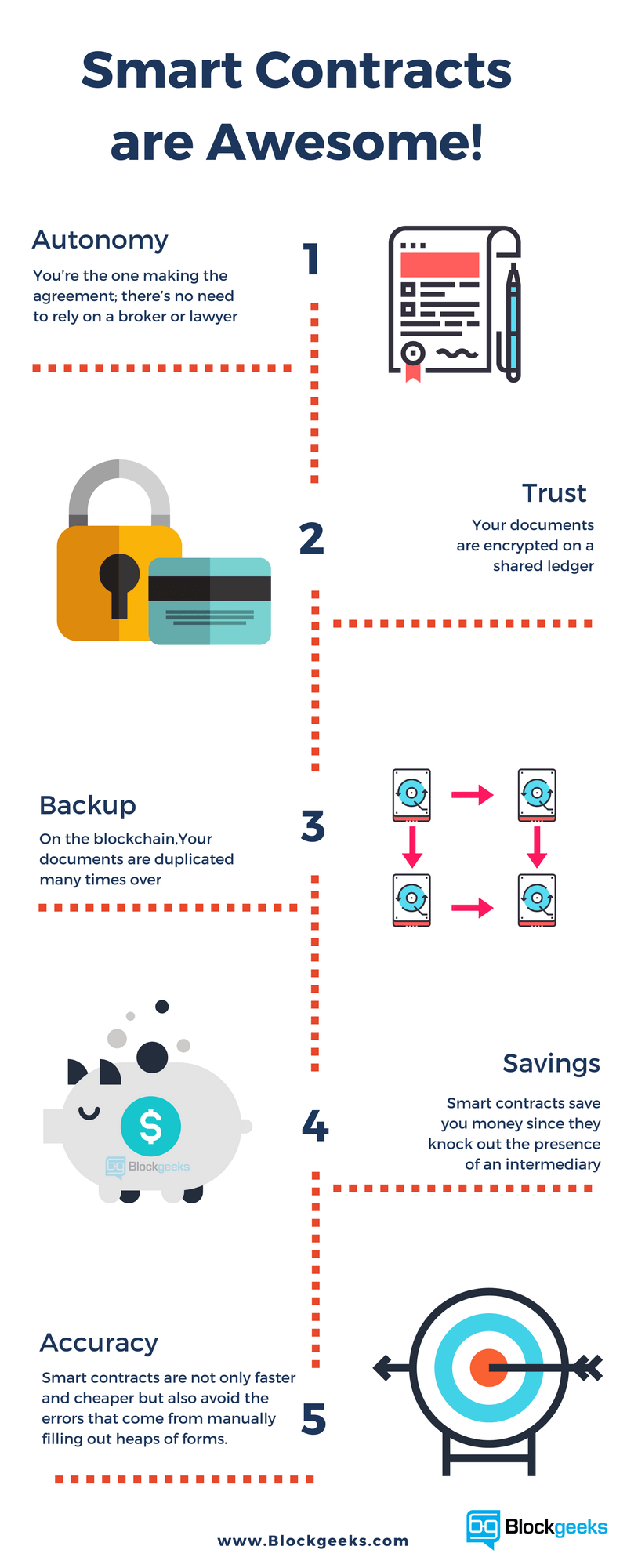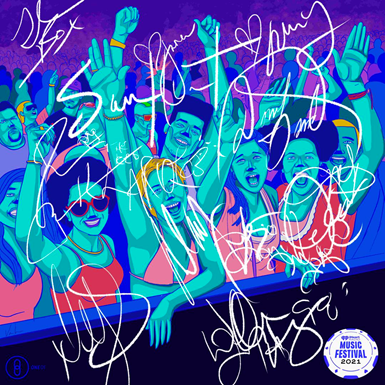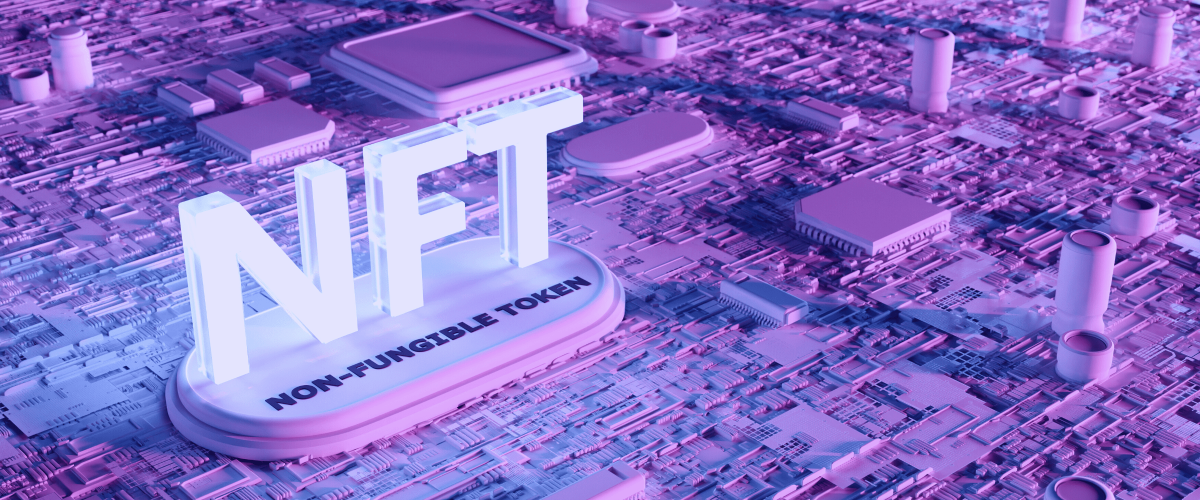The Covid 19 pandemic forced entertainment agencies to look for new entertainment ideas to create income. During the pandemic, the entertainment industry struggled with cancellations of live events and social distancing restrictions.
Entertainment agencies were compelled to think outside of the box with a more technical flare to reach fans. Artists turned to live streaming, more virtual concerts, and even hosting virtual reality concerts on gaming platforms, such as Fortnite or WaveXR. Large tech companies noticed this trend and began investing heavily in new emerging technology concepts with many ideas now starting to appear in our everyday lives.

A highly publicized emerging technology is Blockchain. According to Kevin Voigt, a former reporter for Wall Street Journal, a blockchain is a digital ledger of transactions that are maintained by a network of computers, making it difficult to alter or hack. Blockchain offers the option for individuals to conduct transparent transactions without a third party, such as banks or governments (Voigt and Rosen).
Blockchain technology has been widely applied to cryptocurrencies, such as Bitcoin and Ethereum. More recently, blockchain has been applied to the creation of non-fungible tokens, or NFTs. Within the blog, I will explain what an NFT is and how it works, and specifically how the entertainment industry can benefit.
What are NFTs and How Do They Originate New Entertainment Revenue Options?
NFT stands for “non-fungible token.” It is a crypto (cryptocurrency) asset that displays ownership of digital artwork, such as drawings, recordings, and virtual assets. An NFT is unique. It cannot be identical to any other. An NFT can be infinitely copied, but no one has the original besides the owner. For example, many people have copies of the Mona Lisa, but there is only one original.
Today’s blockchain technology makes it possible for people to buy objective ownership of their favorite artists’ work. NFTs are most commonly purchased using Bitcoin or Etherum, but more cryptocurrencies are being used as more emerge. Once you have your own cryptocurrency to buy the NFT, you can purchase it through an online marketplace. The most common NFT marketplaces as of now include, but are not limited to, OpenSea, Rarible, Axie Infinity, and Decentraland. More are routinely being announced as entrepreneurs try to take advantage of the new rage of buying NFTs.
NFT sales volume totaled $24.9 billion in 2021, compared to just $94.9 million (the year before, according to DappRadar. DappRadar collects data across ten different blockchains, which are used to record who owns the NFT.
The biggest hurdle on expansion of NFT use is the ambiguous name and that it is grounded in the blockchain universe. Most people over 35 think of both these terms as some sort of techno talk of no apparent value to them. That digital divide is apparent in a finding from Variety’s “Demographic Divide” report. (Bridge). Varity report found that overall interest in the NFT phenomenon is strongest among those age 15-29, with 52% interested in at least one of the categories measured. That percentage declines steeply the older one gets, as just 12% of those 60+ say they’re likely to engage.
Many companies are beginning to evaluate the use of NFTs and how they can be implemented into their business models. Essentially, it’s another way to sell products or services. In return, companies are making secure transactions and creating digital artwork that can be continuously sold. NFTs are emerging in most industries, but we are seeing more involvement in the entertainment industry.
How NFTs Enable New Entertainment Ideas and Who Would Benefit?
Decentralized Smart Contracts
The beauty of NFTs is the ability to embed smart contracts on the blockchain. There are many ways smart contracts can be utilized. As mentioned, NFTs can have just about anything attached to it, which is all possible through smart contracts. Below is a simple diagram of how a smart contract works.

To connect with fans, an artist might attach free “meet and greet” passes to their next live music event via an NFT’s smart contract. Another idea is when a fan buys an NFT, they also receive mystery merchandise. All are great ideas for a music artist, but there is a greater benefit. Smart contracts can give the artist resale royalties, which means every time the NFT is sold, the artist will receive a royalty.
Smart contracts protect everyone involved in an NFT sale, whether it be the musical entertainer, agency, or fan. Since NFTs are purchased through blockchain technologies, the network of peer-to-peer computers allows for a secure, decentralized transaction. Everything is then stored on a ledger and cannot changed.
NFT Can Increase Entertainment Agency/Artist Engagement
Music NFTs can be in the form of any digital artwork. It allows artists to flex their creative muscles when interacting with fans. An artist can choose to release their next album or single as an NFT. Artists can sell merchandise, concert tickets, meet and greet passes, photos, and pretty much anything they want to provide. If they tweeted or posted something on Instagram that that gained a lot of engagement, they could make the tweet an NFT, creating even more engagement.
In 2021, Kings of Leon released their new album, When You See Yourself, as an NFT to become the first band ever to explore this route (Shafer). In fact, the band offered three types of NFTs as part of their “NFT Yourself” series. In addition to the special album package, they also released perks for their live shows as well as exclusive audiovisual art as two other types of tokens. The band managed to generate more than $2 million (Moore) by means of the NFT sales.
Similarly, entertainment agencies can get in on the action as well. Agencies that put-on events can create NFTs for fans that plan to attend an event. According to Deip Trans, a reporter for Backstage Magazine, talent agencies including CAA, UTA, and WME are taking advantage of the technology by signing on as advisors for an NFT marketplace called Notables. The startup will create and sell NFTs for their clients and fanbase (Tran). Promoters that facilitate music festivals can create limited edition festival NFTs like shown below.

Fans can benefit from NFTs because it’s another way to support their favorite artist while receiving ownership of a unique form of art. Let’s not forget, they can receive much more than digital ownership. Fans can also win one-of-a-kind experiences. For example, Post Malone auctioned off a game of beer pong via NFT. How fun!
NFTs Can Provide Additional Entertainment Revenue Options
Musical entertainers have not always been given a fair share of what they produce. Fortune Media stated on average, a music performer receives about 50% of the revenue from a live music performance, while the other half is distributed to the venue, talent buyers, agents, lawyers, etc. (Tengblad). According to Indie Music Academy, based on an artist’s following, major record labels walk away with an 80-87% cut of physical CD sales, while the artist is left with 13-20% (Indie Music Academy).
Unlike the European Union, artists in the United States do not earn a performance royalty. If their recordings reach number one on radio charts and is played by thousands of radio stations, they receive no royalties from it, unless there is some contractual arrangement with the record label. While the record label, publishing agency and songwriter receive royalties, the performing artist does not. That has led many artists to require that they get part of the songwriting credit and royalty to record a song. Artists are always looking for additional ideas to increase their revenue for their entertainment efforts.
When it comes to streaming, the payout can be worse. The royalty structure for streaming services is not always straightforward and leaves artists confused about what exactly their streaming royalties are. After a deal is made, artists make very little money from third-party streaming platforms, such as Spotify and Apple Music. Spotify is particularly grievous in paying low royalties to artists. Now, NFTs are sparking interest for artists because it is decentralized, making it possible for more revenue and post-career earnings.
The Dallas Observer reported in February 2021 that 3LAU made $11.6 million off selling music NFTs in only 24 hours. Later, Grimes made $5.8 million in just 20 minutes (Blackmon). Many artists continue to follow the money reaping trend. Below is an image of 3LAU’s Worst Case NFT.

Another benefit of musical artists and performers selling NFTs is the control over the sales price without involving a third party. Usually, major labels and streaming platforms’ contracts set a specific earnings rate, which is calculated through numerous factors. As you can imagine this is heavily weighted so that the streaming platform or record label make almost of the income from streaming.
Now, artists can auction off their NFTs, allowing fans to decide on how much their music is worth. This gives artists a better sense of how much their work is worth in the eyes of their fans, not through a major label or streaming giant point of view.
Entertainment companies can also generate more revenue through non-fungible tokens while creating a secure, safe event. Event ticketing is where a lot of revenue is generated, but it is also an area that can lose money. Many fans try to get their favorite artist’s concert tickets but are held back because of automated bots buying up tickets and inflated secondary market prices.
Along with bots and ticket scalping, fans can also fall victim to buying counterfeit tickets. An article from Forbes in 2018 reported around 12% of event attendees purchased counterfeit tickets (Bansal). This is a major issue for both the ticketing agency and fans because both parties lose money. It’s a problem for the performing artist because many fans associate being scammed with the performance and will shy away from future shows by that artist.
To combat common ticketing fraud issues, companies may turn to NFTs for a more secure online ticketing transaction. As mentioned previously, online ticket companies, or sellers, can set tokens sale and resale prices, as well as receive royalties with every ownership transfer. Another advantage of using NFTs is a form of a concert ticket. Companies can allow fans to bid on tickets. In this way the market (fans) sets the price of tickets, instead of ticketing companies or artists’ management.
There are several ways online ticketing companies can take advantage of NFTs. Ticketing businesses can sell some “NFT tickets” along with the current way they sell tickets. They can also sell all entertainment tickets using NFTs and/or auction a few off once an event is sold out. These strategies can be especially smart to implement if a portion of your target audience demographics (younger, male and educated), i.e., target persona, is likely to be aware of and interested in cryptocurrency and NFTs.
Lastly, fans themselves can earn revenue from investing in an NFT with streaming ownership. Music artists can attach music streaming rights to their tokens via a smart contract. Every time the specific song is streamed, the owner of the NFT will receive a royalty. For example, in October 2021, American DJ, 3LAU, sold 333 tokens with streaming rights to his single, Worst Case. The tokens totaled 50% streaming ownership. At the beginning of 2022 fans already received $6 million in streams according to Music Business World magazine (Stassen). The streaming royalty percentage might seem low at first, but over a lifetime can prove to be a good investment.
As you can see, NFTs hold a lot of potential value for the future of the entertainment industry. Any business can adopt the use of NFTs. Tokens have proven to generate more engagement and revenue using smart contracts. Major music industry companies are evaluating the longevity of NFTs and if the market for NFTs will continue to grow. If so, we will be seeing a increasing trend to using NFTs by in place of traditional ways of doing business in the music business.
TSE Entertainment supports any ways that artists can be more fairly compensated for work. Only time will tell if NFTs offer the entertainment ideas necessary to make that happen.
References:
Bansal, Atal. “Council Post: Beyond Crypto Artwork: How Nfts Are Influencing Modern Business.” Forbes, Forbes Magazine, 30 July 2021, https://www.forbes.com/sites/forbestechcouncil/2021/07/30/beyond-crypto-artwork-how-nfts-are-influencing-modern-business/?sh=77d1d0d94bcf.
Blackmon, Malen. “NFTs Are Taking off in the Music Industry. What’s an NFT?” Dallas Observer, Dallas Observer, 28 Apr. 2021, https://www.dallasobserver.com/music/how-are-nfts-changing-the-music-industry-also-what-the-hell-is-an-nft-12012567.
Bridge, Gavin. “The Demographic Divide: A Special Report.” Variety, 1 Sept. 2021, https://variety.com/vip-special-reports/the-demographic-divide-a-special-report-1235044809/
Moore, Sam, “Kings of Leon have generated $2million form NFT sales of their new album.” NME, 12 Mar 2021, https://www.nme.com/news/music/kings-of-leon-have-generated-2million-from-nft-sales-of-their-new-album-2899349
“Music Royalties Explained: The Ultimate Guide for 2020.” Indie Music Academy, https://www.indiemusicacademy.com/blog/music-royalties-explained.
Stassen, Murray. “Nas to Let Fans Buy Shares in Streaming Royalties via Nfts on Music Investment Platform Royal.” Music Business Worldwide, 6 Jan. 2022, https://www.musicbusinessworldwide.com/nas-to-let-fans-buy-shares-in-streaming-royalties-via-nfts-on-music-investment-platform-royal13456/.
Shafer, Ellise, “kings of Leon to Offer New Album a NFT.” Variety, 3 Mar.2021. https://variety.com/2021/music/news/kings-of-leon-release-new-album-nft-1234921278/
Sweeting, Paul. “NFT + Entertainment: A Special Report.” Variety, 1 Nov. 2021, https://variety.com/vip-special-reports/nft-entertainment-a-special-report-1235097686/
Tengblad, Mattias. “Commentary: Nfts Are Revolutionizing the Music Industry Too.” Fortune, Fortune, 29 Oct. 2021, https://fortune.com/2021/10/29/nfts-music-industry/.
TRAN, DIEP. “How WME, CAA, and UTA Are Capitalizing on Nfts | Backstage .” Backstage, 24 Sept. 2021, https://www.backstage.com/magazine/article/major-hollywood-agencies-nfts-73896/.
Voigt, Kevin, and Andy Rosen. “Blockchain: What It Is and How It Works.” NerdWallet, 4 Nov. 2021, https://www.nerdwallet.com/article/investing/blockchain.
Related Post:
Event Marketing Strategy: 5 Tips for Live Event Posters




